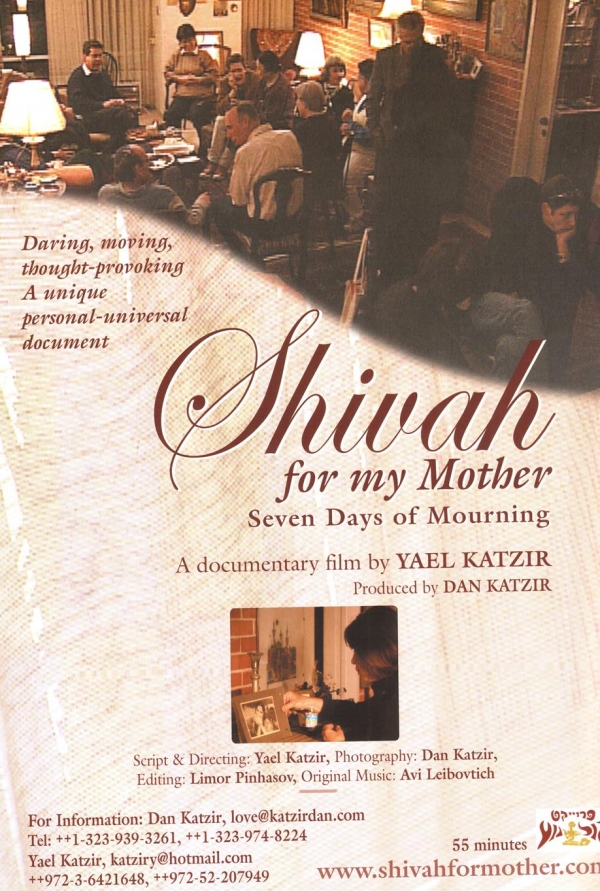SHIVAH FOR MY MOTHER

SYNOPSIS
For the first time a full Shivah the seven traditional days of mourning in the Jewish culture are documented in real time as an intimate portrait of the mourning voyage. Family and old friends gather in the living room of the filmmaker’s deceased Mother to honor her and celebrate her life, during the traditional seven days of mourning (the “Shivah” of the title.) Filmed unobtrusively in real time by Dan Katzir, (himself a filmmaker Yael Katzir’s son, (grandson of the deceased) , this documentary skillfully weaves family stories and Israeli history.
With both tenderness and irony, it offers a fascinating view of the two communities brought together by the parents’ marriage: Mother, the “wild” Sabra Ziona, native-born Israeli whose very name symbolizes her deep, activist engagement with the fledgling state, and Father, Erwin Rabau, the refined, proper “Yekke,” as Hebrew slang referred to German immigrants, the Doctor from Berlin (wearing Jackets) .
The Shivah develops on two parallel levels in the living room, friends and family members who knew Ziona, come to console the family. Stories about her life, her commitment in building the young state, make them all laugh and cry, sing and fall silent. Thus the family saga unfolds rhythmically in alternation with national events.
But it is in the more private spaces of the parents’ house, or at more quiet moments after the guests leave each day, that the most revealing dramas take place. Yael and her sister Nurit, now successful professionals, sit at the kitchen table struggling to come to terms with their complicated relationship to their Mother, speaking to the eternal child in all of us. The director’s son and daughter confront her in a relentless interview in the bedroom. Ziona’s son Micha, now a physician, reflects wistfully about his Mother’s expectations of her only boy. In these moments, the film raises the all-too-painful questions about Mothering, about how and why we transmit values to our children, about the frailty and shortcomings of even the deepest love. Brutally honest and beautifully crafted, this woman’s journey through the process of mourning and reconciliation moves from a deeply personal story to a universal one. In so doing, it becomes a work of art. The film’s title, “Shivah For My Mother”, can be read in two ways. It is both the process of grieving, and the memorializing of an extraordinary woman’s life. As such, Yael Katzir’s film offers her Mother the hug she herself craved for.
DIRECTOR'S STATEMENT - YAEL KATZIR
In this intimate portrait, family and old friends gather in the living room of the filmmaker’s deceased Mother to honor her and celebrate her life, during the traditional seven days of mourning (the “Shivah” of the title.) Filmed unobtrusively in real time by Dan Katzir, himself a filmmaker and Yael Katzir’s son, this documentary skillfully weaves family stories and Israeli history. With both tenderness and irony, it offers a fascinating view of the two communities brought together by the parents’ marriage: Mother, the “wild” Sabra Ziona, native-born Israeli whose very name symbolizes her deep, activist engagement with the fledgling state, and Father, Erwin Rabau, the refined, proper “Yekke,” as Hebrew slang referred to German immigrants, the Doctor from Berlin.
As friends who knew Ziona well reminisce about her life and pay homage to her commitment in building the young state, they laugh and cry, sing and fall silent, as the family saga unfolds rhythmically in alternation with national events.
But it is in the more private spaces of the parents’ house, or at more quiet moments after the guests leave each day, that the most revealing dramas take place. Yael and her sister Nurit, now successful professionals, sit at the kitchen table struggling to come to terms with their complicated relationship to their Mother, speaking to the eternal child in all of us. The director’s son and daughter confront her in a relentless interview in the bedroom. Ziona’s son Micha, now a physician, reflects wistfully about his Mother’s expectations of her only boy. In these moments, the film raises the all-too-painful questions bout Mothering, about how and why we transmit values to our children, about the frailty and shortcomings of even the deepest love.Brutally honest and beautifully crafted, this woman’s journey through the process of mourning and reconciliation moves from a deeply personal story to a universal one. In so doing, it becomes a work of art. The film’s title, “Shivah” For My Mother, can be read in two ways. It is both the process of grieving, and the memorializing of an extraordinary woman’s life. As such, Yael Katzir’s film offers her Mother the hug she herself craved.
